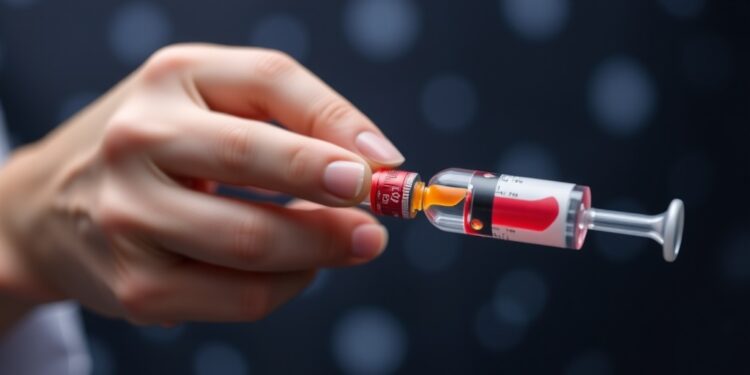In a groundbreaking revelation that bridges the intricate realms of chromatin biology and aging, researchers have unveiled an unprecedented mechanism of centromere inactivation in human cells that occurs during the aging process. This discovery, spearheaded by a team of scientists and encapsulated in an exhaustive study, identifies both the causes and potential therapeutic interventions for this phenomenon. Centromeres, the pivotal chromosomal regions responsible for kinetochore attachment and subsequent chromosomal segregation, exhibit remarkable alterations as cells age. These changes are now understood to compromise genome stability and cellular division accuracy, offering new insights into the molecular underpinnings of aging and age-related diseases.
The centromere’s role in chromosomal integrity is governed by a unique chromatin architecture, primarily characterized by the presence of the histone H3 variant CENP-A. This specialized nucleosome plays an indispensable role in recruiting essential kinetochore proteins such as CENP-C. However, the study delineates a striking decline in CENP-A levels in aging cells, attributed to a p53-dependent pathway. As cells age, they accrue DNA damage, triggering the activation of p53, a key tumor suppressor protein that regulates cell cycle arrest and senescence. In this context, p53 activation exerts a profound inhibitory effect on the transcription and translation of CENP-A and CENP-C, culminating in the inactivation of centromeres.
The researchers meticulously tracked the fate of centromeres across various models of cellular aging, including human fibroblasts obtained from donors spanning a broad age spectrum and chemically induced senescence models. Using high-resolution imaging and RNA sequencing, they demonstrated that the depletion of CENP-A and CENP-C coincides with an accumulation of heterochromatic marks such as H3K9me3, accompanied by a reduction in transcriptionally active marks like H3K4me2. This epigenetic shift effectively silences centromeric transcription, a critical process for de novo CENP-A loading and chromosomal stability.
A pivotal discovery in this study is the role of lysine-specific demethylase 1 (KDM1A/LSD1) in centromeric transcriptional repression. The team uncovered that LSD1 is actively recruited to centromeres in aged cells, mediated by the centromere-binding protein CENP-B. This recruitment leads to the demethylation of H3K4me2, a modification crucial for centromeric RNA transcription. By silencing LSD1 with the small molecule inhibitor 2-PCPA, the researchers succeeded in restoring H3K4me2 levels and reactivating centromeric transcription in aged cells. This intervention also reinstated the expression of CENP-A and mitigated the mitotic defects typically observed in senescent cells.
Further amplifying the study’s significance is the dual inhibition strategy targeting p53 and LSD1. When combined, these interventions not only restored centromeric function but also rejuvenated the cell cycle potential of aged fibroblasts. Mitotic abnormalities, including chromosome missegregation and micronuclei formation, were markedly reduced. Additionally, EdU incorporation assays revealed a significant improvement in the proliferative capacity of aged cells subjected to this dual inhibition. These findings underscore the potential for targeted epigenetic therapies to counteract cellular senescence and enhance genome stability in aging cells.
Human tissue samples, including those from the lung and kidney, corroborated these findings, revealing consistent downregulation of centromeric transcripts and CENP-A levels with advancing age. Notably, variations in centromeric activity were observed across tissue types, reflecting the heterogeneity of the aging process. The study also extended its analysis to murine models, demonstrating that the decline in centromeric protein expression and transcriptional activity is a conserved feature of aging across species.
This research not only elucidates a novel epigenetic mechanism underlying centromeric inactivation but also opens avenues for therapeutic exploration. By targeting LSD1 and p53, it may be possible to develop interventions that restore chromosomal integrity and mitigate age-related cellular dysfunction. The implications of this work extend beyond fundamental biology, offering potential applications in addressing age-related pathologies and enhancing tissue regeneration.
The findings presented in this study are poised to redefine our understanding of aging at the chromosomal level. The strategic restoration of centromeric function presents a promising frontier in the pursuit of longevity and improved cellular health. As the research community delves deeper into the molecular intricacies of aging, these revelations underscore the transformative potential of precision epigenetics in combating the deleterious effects of aging.
Subject of Research: Centromere inactivation and reactivation mechanisms in human aging cells
Article Title: Centromere inactivation during aging can be rescued in human cells
News Publication Date: 2025
Article Doi References: [GSE250322](https://www.ncbi.nlm.nih.gov/geo/query/acc.cgi?acc=GSE250322)
Image Credits: Not provided
Keywords: centromere, aging, epigenetics, CENP-A, CENP-C, p53, LSD1, chromatin, genome stability, cellular senescence





